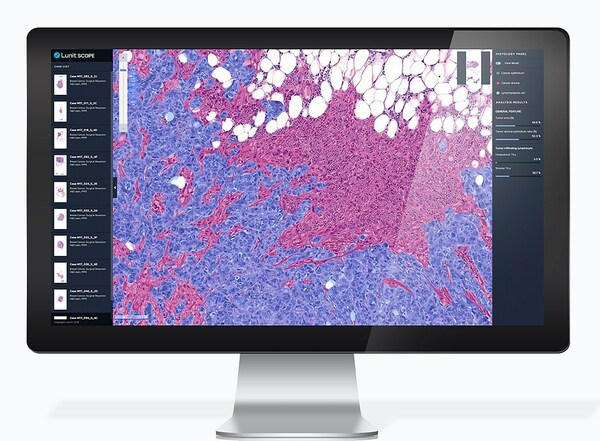
- Lunit and collaborators demonstrate key progress in the development of novel diagnostics for cancer therapies, including immuno-oncology, in addition to molecular targeted agents and antibody-drug conjugates
- Presentations to deliver new research using Lunit SCOPE in a wide range of cancer types and treatment settings
SEOUL, South Korea, April 11, 2023 /PRNewswire/ -- New findings demonstrate important progress in the development of novel diagnostics for immunotherapy among other important cancer therapies, according to Lunit. Lunit will deliver five poster presentations featuring its AI-biomarker platform, Lunit SCOPE IO, at the annual meeting to be held in Orlando, Florida, on April 14-19.

One of the studies to be presented evaluates a deep learning-based ensemble model to predict the KRAS G12C mutation, most common among KRAS gene mutations, which accounts for 25% of non-small cell lung cancer patients. Employing the AI model developed using samples from The Cancer Genome Atlas LUAD and LUSC (TCGA-Lung), researchers conducted a novel approach to improve the performance of KRAS G12C prediction.
According to the research, the prediction model showed improved accuracy compared to previously reported KRAS mutation prediction studies. The Lunit SCOPE based KRAS G12C mutation prediction model showed a high predictive power with an AUC (Area Under the Curve) of 0.787, indicating the accuracy of the AI algorithm. It also showed AUC of 0.745 in validation with independent external data.
"As the KRAS G12C mutation has become targetable in NSCLC, tissue-based KRAS mutation tests are now an essential practice for treatment decisions," explained Chan-Young Ock, Chief Medical Officer at Lunit. "By combining simple H&E analysis model with Lunit SCOPE IO's in-depth predictive features, our novel approach showed significant improvement in prediction. In the future, we believe that such a model will be able to provide predictive results before applying molecular testing, which is relatively time-consuming and expensive, and may help enable rapid treatment decisions."
Another study demonstrates the effectiveness of Universal immunohistochemistry (UIHC), an AI-powered image analyzer, in detecting and quantifying untrained new targets of interest expressed in multiple cancer types. The AI model was trained on the dataset of PD-L1 and HER2 stained lung, bladder, and breast cancer slides, and evaluated on its performance on the hold-out IHC dataset of untrained target and cancer types. Compared to the AI models trained with a single IHC and cancer type, UIHC showed superior performance for new IHC and cancer types. Researchers concluded that UIHC model will be a useful tool for the future clinical research targeting novel tumor-associated antigens.
Other studies to be presented further demonstrate the effectiveness of Lunit SCOPE IO as a diagnostic aid in the treatment of various cancer types.
Lunit SCOPE IO analyzes a patient's cancer tissue slide image by observing the distribution of tumor-infiltrating lymphocytes (TIL)—one of the immunocytes that fight cancer cells. Based on the spatial distribution pattern of TILs and cancer cells in the tumor microenvironment, Lunit SCOPE IO identifies the tissue sample as one of three immune phenotypes (IP): inflamed, immune-excluded, or immune-desert.
In one study assessing Lunit SCOPE IO as a predictive biomarker for anti-PD-1 therapy in advanced biliary tract cancer (BTC), researchers conducted a retrospective analysis of the relationship between the clinical outcomes and TIL using the AI solution. After analysis of pre-treatment whole slide images and clinical outcomes, patients with the inflamed IP had favorable clinical outcomes after anti-PD-1 therapy than other phenotype groups, showing that immune phenotypes as classified by Lunit SCOPE IO could be an effective biomarker to predict the clinical outcomes of patients with advanced BTC.
Other studies include an analysis of the distribution of TILs and associated genomic signatures based on proximity to the tumor-stromal border (TSB) in the TCGA pan-carcinoma dataset, as well as an application of Lunit SCOPE IO in the TCGA ovarian cancer dataset demonstrating the enrichment of inflammatory immune and transcriptomic traits in the Inflamed IP classified by the AI solution.
"We are excited to bring new research using Lunit SCOPE in more cancer types and treatment settings," said Brandon Suh, CEO of Lunit. "Lunit will continue to enable novel academic research and innovative product development to provide the most appropriate treatment for cancer patients."
Visit the Lunit team at Booth 2671. Reach out to schedule a meeting at (oncology@lunit.io).
Lunit's Abstracts at AACR 2023
About Lunit
With AI, Lunit aims to 'conquer cancer,' one of the leading causes of death worldwide. Lunit is an AI software company devoted to developing AI solutions for precision diagnostics and therapeutics, to find the right diagnosis at the right cost, and the right treatment for the right patients.
Lunit, a portmanteau of 'learning unit,' is a deep learning-based medical AI company devoted to developing advanced medical image analytics and data-driven imaging biomarkers via cutting-edge technology, including both radiology and pathology. Founded in 2013, Lunit has been acknowledged around the world for its advanced, state-of-the-art technology and its application in medical images. As of today, about 2,000 hospitals around the world use Lunit technology to optimize clinical decisions.
About Lunit SCOPE
Lunit SCOPE is a suite of AI-powered software that analyzes tissue slide images for digital pathology and AI biomarker development, with the aim of optimizing workflow and facilitating more accurate and predictive clinical data for clinicians and researchers.
Lunit SCOPE platform offers multiple tissue analysis AI software products and assays that can streamline digital pathology workflow and diagnostics, as well as enhance the drug development process.
The flagship product, Lunit SCOPE IO, generates immune phenotype reports based on H&E analysis and provides AI-based predictive clinical outcome information. In addition, services are also offered by assessing protein expression via Immunohistochemistry (IHC) slide analysis, through products such as Lunit SCOPE PD-L1, Lunit SCOPE HER2, Lunit SCOPE ER/PR, and others.

